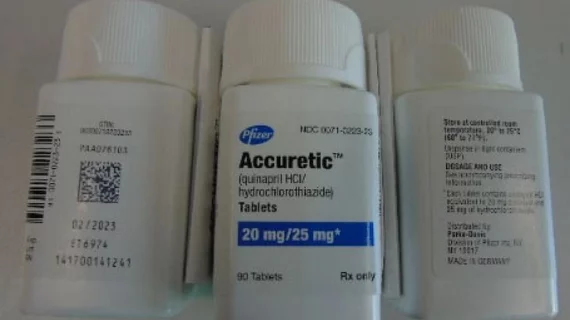FDA announces recall of hypertension medications due to potential cancer risk
The FDA has announced that Pfizer is recalling multiple hypertension medications due to the presence of unacceptable levels of nitrosamine.
Nitrosamine, or N-nitroso-quinapril, is regularly found in water and food, but at low levels. Exposure to high levels, however, has been linked with an elevated risk of cancer.
The voluntary recall includes quinapril HCl/hydrochlorothiazide tablets, which Pfizer sells under the name Accuretic, and generic quinapril and hydrochlorothiazide tablets distributed by Greenstone.
“To date, Pfizer is not aware of reports of adverse events that have been assessed to be related to this recall,” the company said in a statement shared by the FDA.
If any patients do experience an adverse event related to these medications, Pfizer added, they can be reported to the FDA’s MedWatch Adverse Event Reporting program. More information is available here.
Pfizer also said that any patients taking these products should consult with a physician about other treatment options.
All lots included in the recall were distributed in the United States and Puerto Rico from November 2019 to March 2022.
More from the FDA on nitrosamine impurities:
The FDA website includes helpful information about nitrosamine impurities for any patients or healthcare providers hoping to learn more.
“Nitrosamines are common in water and foods, including cured and grilled meats, dairy products and vegetables,” according to the agency. “Everyone is exposed to some level of nitrosamines.”
However, drugs containing nitrosamines “above the acceptable daily intake limits” can increase a person’s risk of cancer over time.
Additional Heart Health Content:
DOACs may reduce the risk of dementia among AFib patients by 50%
Older LAAO patients, especially women, face a higher risk of complications
Bariatric surgery associated with lower risk of death and cardiovascular disease
Evolocumab limits adverse cardiovascular outcomes among PCI patients
FDA announces a new recall for extended-release metformin due to contamination

